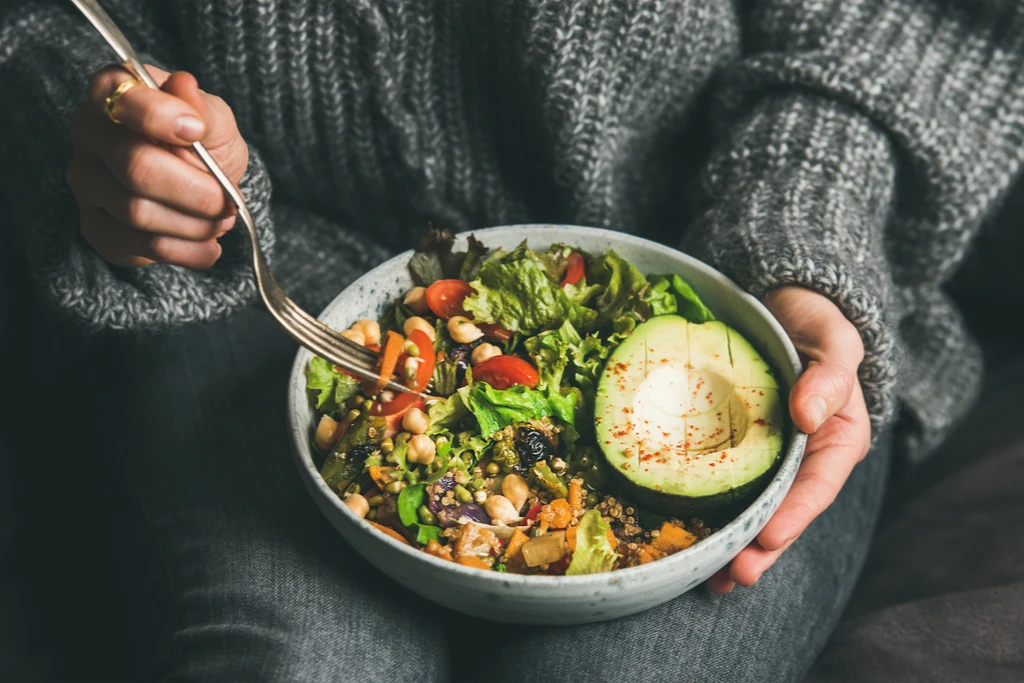How To Build Muscle On A Plant-Based Diet

April 13, 2018

There are a number of considerations that go along with following, or thinking of following, a plant-based diet like a vegetarian or vegan diet. A common question is whether you can still build muscle on a plant-based diet, if you're not eating animal protein such as chicken, fish, red meat, dairy or eggs.
Can you build buscle on a plant-based diet?
The good news is following a plant-based diet doesn’t mean you can’t build muscle or perform at a high level when it comes to your training - woohoo! A well-balanced plant-based diet with good vegetarian sources of protein can provide the energy and nutrients needed for efficient training and muscle growth. Let’s look at a few things you can do to help increase muscle on a plant-based diet.Jump to:
Be consistent with your training
Nutrition aside, being consistent with your training is important to achieving the results you want. Being consistent with how often you workout, as well as how you actually train, can make a big difference. This particularly applies if you want to build muscle.
If building muscle is your goal, then you should be doing resistance-based strength training regularly. This stresses the muscle fibres and creates micro-tears which your body then repairs and rebuilds. A consistent training routine that balances resistance and rest can help you to increase your strength and muscle growth. Yep, you need time for muscle recovery as well. Your muscles actually repair and grow in the rest time, not the workout time!
The good news here is that plant-based can be slightly higher in antioxidants if you're eating lots of fresh produce, which may help your body to recover a little faster.
Fuel your body
Before you start eating to fuel muscle growth after a workout, it’s important for your body to have the energy to do that workout! That’s where carbohydrates come in.
Your body needs good-quality carbohydrates to power your muscles, as well as your brain. Without sufficient carbs, you can find yourself running low on energy, stamina and concentration. Carbohydrates are also necessary for muscle growth, as they trigger a release of insulin which can stimulate the absorption of amino acids found in the protein you eat. Aim to get your carbs from whole-food sources such as grains, fruits and vegetables to help keep up your energy levels.

Provide your body with plant-based protein
Protein is an essential component of any diet, particularly if gaining more muscle is one of your goals. It provides your body with essential amino acids, which are the building blocks for the repair and rebuilding of muscle fibres. Meat, dairy and eggs are high in protein and contain all of the essential amino acids, but that doesn’t mean plant-based protein isn’t effective for building muscle — it just may take a little more planning to get what your body needs.
How do you ensure you’re getting adequate protein? According to Mayo Clinic, very active people should aim to eat 1.2-2 grams of protein per kilogram of bodyweight each day, or 0.8 grams per kilogram of bodyweight for less active people (there are 0.36 grams in a pound).
That means a woman weighing around 70 kg (approx 154 pounds) should be eating 80-130 grams of protein each day, depending on your activity levels and fitness goals. Keep in mind this is just a general recommendation and you may have to adjust slightly depending on your level of physical activity and how you feel.
Sources of plant-based protein
There are lots of ways to get the nutrients you need in a plant-based diet, particularly when it comes to protein. Some of the higher-protein vegan foods you can use include:
Soy products such as tofu, tempeh or edamame beans
Wholegrain rice, oats and quinoa
Nuts and seeds
Lentils and beans (especially black beans and kidney beans)
Eggs and dairy (omit if you are following a vegan diet)
If you like to use protein powders, there are also a number of plant-based options available, including brown rice or pea protein powders.
When you are focused on growing more muscle, protein consumption should be at the forefront of your mind. Spreading that protein intake out across the day and making sure each meal includes a source of protein can help make sure you are getting enough and yourr muscles are adequately absorbing it. Including protein in your pre- and post-workout snacks can also help to fuel your muscles.
Building muscle on a plant-based diet is possible
Following a plant-based diet doesn’t mean that muscle growth is out of reach. Eating quality whole foods and balancing regular weight training with adequate rest means it is completely possible. If a plant-based diet is your preference, don’t allow yourself to be put off achieving your fitness goals. It’s time the myth that plant-based diets can’t complement weightlifting was laid to rest.

A more empowered you starts with Sweat, and our editorial team is here to bring you the latest fitness tips, trainer recommendations, wellbeing news, nutritional advice, nourishing recipes and free workouts.
* Disclaimer: This blog post is not intended to replace the advice of a medical professional. The above information should not be used to diagnose, treat, or prevent any disease or medical condition. Please consult your doctor before making any changes to your diet, sleep methods, daily activity, or fitness routine. Sweat assumes no responsibility for any personal injury or damage sustained by any recommendations, opinions, or advice given in this article.
Nutrition